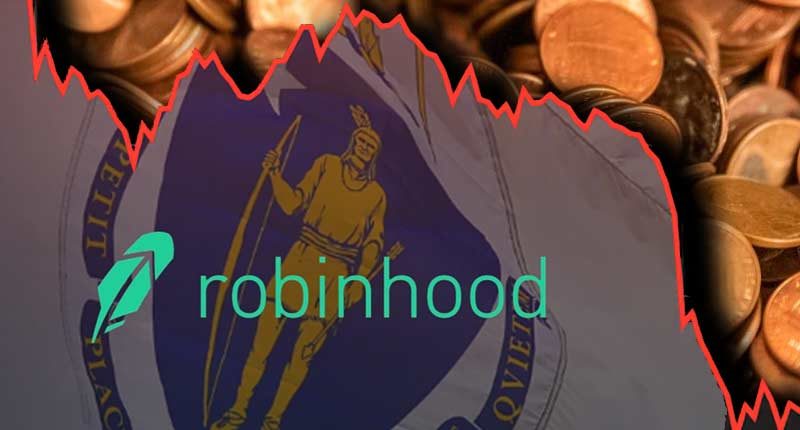Will Massachusetts Regulators Put An End To Robinhood?
Robinhood has become synonymous with penny stocks. Millions of new traders have flocked to the app especially during the recent pandemic. In fact, we did a review of some of the major penny stock brokers in 2020. Based on the brokerage growth statistics, Robinhood has by-far outpaced the growth of other platforms. Unless you’re including the merger between Schwab and TD Ameritrade, no other platform comes close this year.
While some cite users around 13 million, what we can say is that, according to CNBC, Robinhood saw a record 3 million new customers in the first four months of 2020 when the coronavirus pandemic began. Regardless of the figure – 3 million in the first 4 months, 5 million in the first 9 months, or 13 million estimated – Robinhood has seen its user base increase by millions.
Read More
- 3 Robinhood Penny Stocks To Buy As Bitcoin Stocks Push Tech Higher
- Best Penny Stocks To Buy For Under $4.50? 5 To Watch Today
This growth has also brought heavy scrutiny from regulators and traders alike. One of the biggest issues users faced with this app is access. This “access” is on multiple levels. First, access to certain stocks is limited. Those who’re looking for penny stocks on Robinhood will not have access to most OTC penny stocks. The higher risk, lower liquidity generality is likely one of the reasons why. But this also limits access to major industries like cannabis and, now, magic mushroom penny stocks.
More Than Limited Access To Penny Stocks On Robinhood

Furthermore, if you remember our coverage on one of the many Robinhood outages, it was not all good in the Robin hood on many occasions. Some outages even saw the application shut down for full sessions. Meanwhile, limited reporting information and lack of general information from novice traders haven’t helped things either.
Robinhood has had a long history of criticism and for good reason. On November 12, 2019, we published an article titled: Robinhood Left the Unlimited Margin Glitch Unfixed for Nearly a Year. In this article, we talked about members of the Wallstreetbets subreddit identifying “The Infinite Money Cheat Code”. This “glitch” allowed traders to accumulate massive positions on margin.
On Friday, June 12, 2020, 20-Year-Old Alexander E. Kearns committed suicide after seeing a $730,000 negative balance in his Robinhood account. According to an article published on Forbes: Kearns may not have realized that his negative cash balance displaying on his Robinhood home screen was only temporary and would be corrected once the underlying stock was credited to his account. Indeed it’s not uncommon for cash and buying power to display negative after the first half of options are processed but before the second options are exercised—even if the portfolio remains positive.
Now, it’s instances like this, which have raised red flags for regulators.
Massachusetts Files Complaint Against Robinhood
This week, regulators in Massachusetts filed a complaint against Robinhood alleging that the platform “manipulated” customers. It cites “aggressive tactics to attract inexperienced investors”. Furthermore, the popular “gamification” model also came under fire with regulators stating it was another way to manipulate traders in to using the application.
“Robinhood, which earns revenue for trades executed by its customers, gave customers with no investment experience the ability to make a potentially unlimited number of trades, without properly screening them to be approved for options trading.”
This stems from roughly 68% of Massachusetts-based Robinhood customers gaining approval for options trading with limited or no investing experience, reported according to regulators.
In a statement to CNBC, a spokesperson from Robinhood explained a much different scenario.
“We have not seen the complaint, but we have and will continue to work closely and cooperatively with all of our regulators. Robinhood has opened up financial markets for a new generation of people who were previously excluded. We are committed to operating with integrity, transparency, and in compliance with all applicable laws and regulations.″
Robinhood Under SEC Investigation
This isn’t the first, nor likely the last time Robinhood goes under a regulatory microscope. Earlier this year, the Wall Street Journal reported that the platform was under SEC investigation. Specifically, it was for disclosures around the company’s practice of selling clients’ orders to high frequency traders. The result could be a more than $10 million fine if the company settles.
The practice of selling order flow isn’t illegal as many brokers do the same thing. However, due to the revenue generated by the practice with Robinhood specifically, questions began arising.
Will This Impact The Robinhood IPO?
If you’ve followed the storyline of Robinhood, many have expected the company to IPO for a long time. Former Robinhood co-CEO Baiju Bhatt said as early as 2018 that the company was setting its sights on an eventual IPO.

This year, however, saw things become a bit more serious. The company has reportedly brought on Goldman Sachs to lead an IPO. This could value the app at more than $20 billion according to Reuters. The current private valuation is somewhere around $11.7 billion following the last round of financing in September.
Whether or not the latest regulatory issues brought about by Massachusetts or the SEC will stifle the Robinhood IPO are yet to be seen. However, in going public, it’s never a bad thing to be on the good side of regulators. But herein lies the argument. Massachusetts regulators say the platform used shady tactics to attract users. While the “gamification” was a unique angle, it isn’t a brand new tactic and there are other platforms like Stash and Acorns that simplify and sometimes “gamify” the user experience.
Furthermore, this begs a question. Should Robinhood or any broker, for that matter, hold responsibility for someone’s losses (or gains for that matter)? The fact remains, anyone can open a brokerage account with most self-directed brokers. They have immediate access to funding that account. There are also safeguards in place to access things like margin. Additionally, you’ve got the much-debated topic of who can be considered a “day trader”? What makes a more sophisticated trader with a $2,500 account “unqualified” compared to a brand new trader with a $25,000 account?
How do you think this works out for Robinhood and will it impact the pending plan to IPO? Leave a comment below and let us know your thoughts.
5 Popular Penny Stocks On Robinhood Today
- Hexo Corp. (NYSE: HEXO): consumer packaged goods cannabis company that creates and distributes products to serve the global cannabis market.
- Organigram Holdings (NASDAQ: OGI): A Canadian licensed producer of cannabis products and focuses on producing indoor-grown cannabis for patients and adult recreational consumers.
- MFA Financial Inc. (NYSE: MFA): a holding company for its subsidiaries in the real estate finance business, investing in a portfolio of residential mortgage assets on a leveraged basis.
- MicroVision, Inc. (NASDAQ: MVIS): a developer of laser beam scanning technology for products including interactive projection, consumer light detection and ranging (LiDAR), automotive LiDAR, and augmented and mixed reality.
- Gevo Inc (NASDAQ: GEVO): a renewable chemicals and biofuels company engaged in the development and commercialization of alternatives to petroleum-based products.








